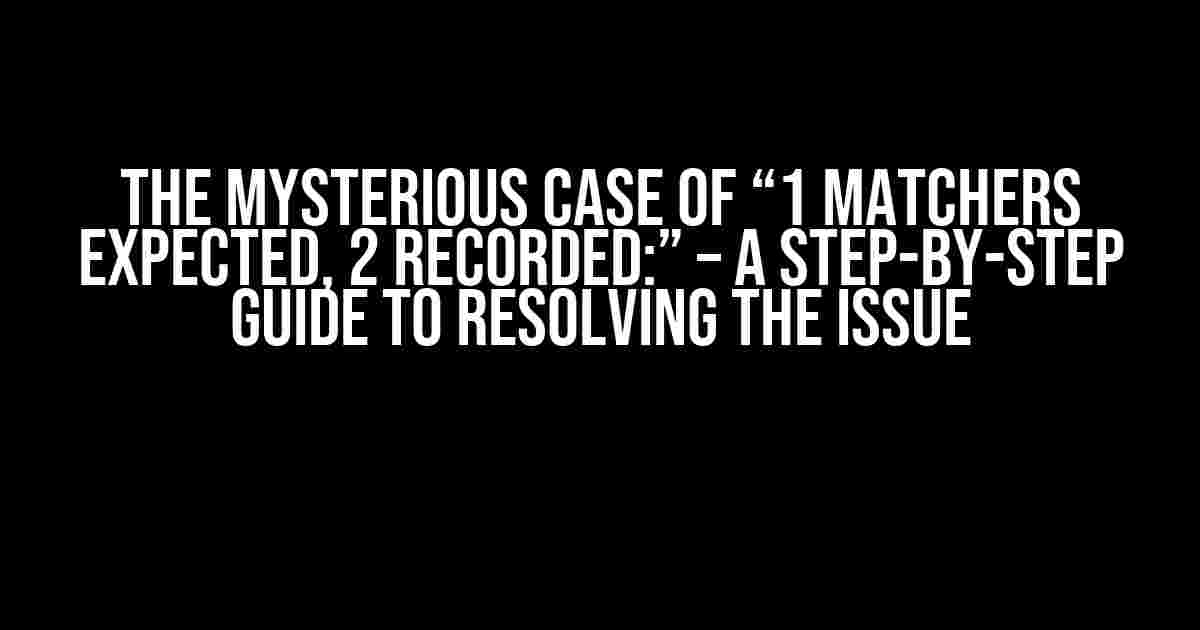- Intro
- What does “1 matchers expected, 2 recorded:” mean?
- Step 1: Identify the Culprit – Review Your Test Cases
- Step 2: Isolate the Issue – Run Tests in Debug Mode
- Step 3: Investigate Matcher Conflicts – Review Matcher Implementations
- Step 4: Reconfigure Your Testing Framework – Check for Misconfiguration
- Step 5: Take a Step Back – Review Your Entire Testing Suite
- Conclusion
Intro
Have you ever encountered the infuriating error message “1 matchers expected, 2 recorded:” while working on a project? You’re not alone! This pesky issue can bring your development to a grinding halt, leaving you scratching your head and wondering what went wrong. Fear not, dear developer, for we’re about to embark on a journey to demystify this enigmatic error and provide you with a comprehensive guide to resolving it once and for all.
What does “1 matchers expected, 2 recorded:” mean?
Before we dive into the solution, let’s take a step back and understand the root cause of the problem. The error message “1 matchers expected, 2 recorded:” typically occurs when your testing framework, such as JUnit or TestNG, expects a single matcher but receives two instead. This mismatch can occur due to various reasons, including:
- Incorrectly written test cases
- Conflicting matchers
- Improper use of parameterized tests
- Misconfigured testing frameworks
Step 1: Identify the Culprit – Review Your Test Cases
The first step in resolving the issue is to carefully review your test cases. Go through each test method and examine the matchers used. Look for any potential conflicts or incorrect usage of matchers. Ask yourself:
- Are you using the correct matcher for the expected result?
- Are there any duplicate matchers in the same test method?
- Are you using parameterized tests incorrectly?
Take, for example, the following code snippet:
public class MyTest {
@Test
public void testMethod() {
List<String> list = Arrays.asList("apple", "banana", "orange");
assertThat(list, hasItem("apple"));
assertThat(list, hasItem("banana"));
}
}In this example, the test method is using two separate matchers, `hasItem(“apple”)` and `hasItem(“banana”)`, which can cause the “1 matchers expected, 2 recorded:” error. To fix this, you can combine the matchers using the `and()` method:
public class MyTest {
@Test
public void testMethod() {
List<String> list = Arrays.asList("apple", "banana", "orange");
assertThat(list, allOf(hasItem("apple"), hasItem("banana")));
}
}Step 2: Isolate the Issue – Run Tests in Debug Mode
If reviewing your test cases doesn’t uncover the issue, it’s time to dig deeper. Enable debug mode in your testing framework to get more detailed output. This will help you identify the specific test method causing the error.
In JUnit, you can enable debug mode by adding the following VM argument:
-Djunit.vm.debug= TRUEIn TestNG, you can add the following parameter to your testng.xml file:
<parameter name="debug" value="true"/>Run your tests again, and this time, pay close attention to the debug output. Look for any clues that might point to the problematic test method.
Step 3: Investigate Matcher Conflicts – Review Matcher Implementations
Sometimes, the issue can be caused by conflicting matcher implementations. Review your matcher implementations and ensure they are correctly implemented.
For example, if you’re using a custom matcher, make sure it’s implemented correctly and doesn’t interfere with other matchers. Take a closer look at the `matchesSafely()` method:
public class MyCustomMatcher extends TypeSafeMatcher<List<String>> {
@Override
protected boolean matchesSafely(List<String> list) {
// Make sure this method is correctly implemented
return list.contains("expectedValue");
}
}If you’re using a third-party matcher, ensure it’s compatible with your testing framework and version.
Step 4: Reconfigure Your Testing Framework – Check for Misconfiguration
If the issue persists, it’s possible that your testing framework is misconfigured. Review your testing framework’s configuration files and ensure that:
- The testing framework is correctly configured
- Matchers are correctly registered
- Parameterized tests are correctly configured
For example, in JUnit, make sure you have the correct `RunWith` annotation:
@RunWith(Parameterized.class)
public class MyTest {
// Test methods
}In TestNG, ensure you have the correct `@Parameters` annotation:
@Parameters({"param1", "param2"})
public class MyTest {
// Test methods
}Step 5: Take a Step Back – Review Your Entire Testing Suite
If none of the above steps resolve the issue, it’s time to take a step back and review your entire testing suite. Look for any patterns or commonalities between the tests that might be causing the issue.
Ask yourself:
- Are there any duplicate test methods?
- Are there any tests that are excessively complex or convoluted?
- Are there any tests that use deprecated or outdated matchers?
Take this opportunity to refactor your testing suite, simplify complex tests, and remove any deprecated or outdated matchers.
Conclusion
The “1 matchers expected, 2 recorded:” error can be frustrating, but by following these steps, you should be able to identify and resolve the issue. Remember to review your test cases, isolate the problem, investigate matcher conflicts, reconfigure your testing framework, and take a step back to review your entire testing suite.
By being methodical and meticulous in your approach, you’ll be able to resolve the issue and get back to writing high-quality tests that ensure your code is robust and reliable.
| Step | Description |
|---|---|
| 1 | Review test cases for incorrect matchers or conflicts |
| 2 | Enable debug mode to isolate the issue |
| 3 | Investigate matcher conflicts and review matcher implementations |
| 4 | Reconfigure testing framework to ensure correct configuration |
| 5 | Review entire testing suite for patterns or commonalities |
By following these steps, you’ll be well on your way to resolving the “1 matchers expected, 2 recorded:” error and ensuring your tests run smoothly and efficiently.
Frequently Asked Question
Get the scoop on the mysterious “1 matchers expected, 2 recorded” error message!
What does “1 matchers expected, 2 recorded” even mean?
Don’t worry, it’s not as cryptic as it sounds! This error message typically appears when there’s a mismatch between the number of expected and actual matching values in your code. Think of it like trying to pair socks – if you expect one pair, but find two, something’s off!
Why does this error occur in my code?
Ah, the million-dollar question! There are several reasons why this error might pop up, but common culprits include incorrect function implementations, misconfigured tests, or even typos in your code. Take a closer look at your logic and see if you can spot the mismatch.
How do I fix the “1 matchers expected, 2 recorded” error?
Time to get debugging! Start by reviewing your code line by line, paying close attention to function calls and test configurations. Look for any instances where you might be expecting one value but getting two. Once you identify the issue, adjust your code accordingly, and voilà! The error should vanish like magic.
Is this error specific to a particular programming language?
Not necessarily! The “1 matchers expected, 2 recorded” error can occur in various programming languages, including Java, Python, and JavaScript, to name a few. The good news is that the root cause is often similar, so the troubleshooting process remains relatively the same.
Can I prevent this error from happening in the future?
Absolutely! To minimize the chances of encountering this error, make sure to thoroughly test your code, use robust debugging techniques, and maintain clean, organized code structures. It’s also essential to keep your dependencies and libraries up to date. By following these best practices, you’ll be well on your way to error-free coding!


